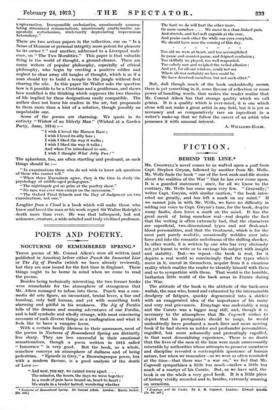POETS AND POETRY.
NOCTURNE OF REMEMBERED SPRING.* THESE poems of Mr. Conrad Aiken's were all written (and published in America) before either Punch the Immortal Liar or The Jig of Forslin (which we have already reviewed), but they are now issued for the first time in England. These things ought to be borne in mind when we come to read the poems.
Besides being technically interesting, the two former books were remarkable for the atmosphere of strangeness that Mr. Aiken managed to infuse into them. Punch was a corn- media del arta figure, an inconstant, brutal lover, a liar and humbug, only half human, and yet with something both alarming and pitiful in his weakness. The Jig of Forslin tells of the dreams and musing adventures of one Forslin, and is half symbolic and wholly strange, with most convincing accounts of such diverse things as a conflagration and what it feels like to have a vampire lover.
With a certain family likeness to their successors, most of the poems in Nocturne of Remembered Spring are distinctly less sharp. They are less successful in their emotional sensationalism, though a poem written in 1915 called " Innocence " is very good. But the book, as a whole, somehow conveys an atmosphere of dullness and of being pedestrian. " Episode in Grey," a Browningesque poem, but with a modern flavour, is a good analysis of the death of Love :- " And now, you say, we cannot move apart . . . The minutes, the hours, the days we wove together In a mesh of pain have bound us, heart to heart : We strain in a tender hatred, wondering whether • Nocturne of Remembered Spring. BY Conrad Aiken. London ; Martin Seeker. Dn. not]
The hurt we do will hurt the other more, Or more ourselves . . . We move in a close-linked pain,
And stretch, and feel soft anguish at the core,
And praise each other the while our eyes complain.
We should have seen the coming of this day.
• • • Too old we were at heart, and too accomplished
In pause and counter-pause, and feigned confusion ;
Too skilfully we played, too well responded, Too calmly saw and weighed the veiled allusion : And yet, for all our wisdom, could not see Where all was certainty no love could be.
We have deceived ourselves, but not each other."
But, dull though much of the book undoubtedly seems; there is yet something in it, some flavour of reflection or some power of handling words, that makes the reader realize that Mr. Conrad Aiken has that strange quality which we call genius. It is a quality which is over-rated, it is one which alone will not make a great artist in any field, but it is yet so necessary and so comparatively rare an ingredient in a writer's make-up that we follow the career of an artist who possesses it with unusual interest.
A. WILLIAMS-ELLis.










































 Previous page
Previous page